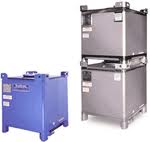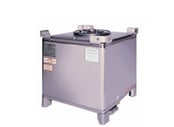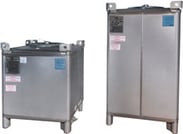 There are two basic types of steel to choose from when picking the right Intermediate Bulk Container (IBC) for your operation: carbon steel and stainless steel. All types of steel are made of a combination of iron and carbon. Stainless steels (304 stainless steel, and 316 stainless steel) are differentiated by the addition of alloys, such as chromium, which alter the physical properties of the steel. While 304 stainless steel is by far the most common material used, it is important to choose whichever steel is best suited for your unique needs.
There are two basic types of steel to choose from when picking the right Intermediate Bulk Container (IBC) for your operation: carbon steel and stainless steel. All types of steel are made of a combination of iron and carbon. Stainless steels (304 stainless steel, and 316 stainless steel) are differentiated by the addition of alloys, such as chromium, which alter the physical properties of the steel. While 304 stainless steel is by far the most common material used, it is important to choose whichever steel is best suited for your unique needs.
304 stainless steel has long been the industry standard. A vast majority of companies are going to find that 304 stainless steel is the best suited material for their needs. 304 stainless steel is more cost effective than other types of stainless steel, and the addition of chromium provides 304 stainless steel with excellent corrosion resistance. There are some chemicals, such as chloride solutions, that can cause 304 stainless steel to corrode. Depending on the chemicals you are using, 316 stainless steel may be a suitable option.
 316 stainless steel is another type of stainless steel used for IBCs. While not as common (and significantly more expensive), some companies find that 316 stainless steel is necessary to their products. The addition of molybdenum provides superior protection against harsh industrial solvents. 316 stainless steel is sometimes used in the manufacturing of pharmaceuticals in order to reduce metallic contamination. While 316 stainless steel provides superior corrosion resistance, the benefits must be weighed against the higher cost associated with using this steel. Often, 304 stainless steel provides adequate corrosion resistance and the additional protection of 316 stainless steel is unnecessary.
316 stainless steel is another type of stainless steel used for IBCs. While not as common (and significantly more expensive), some companies find that 316 stainless steel is necessary to their products. The addition of molybdenum provides superior protection against harsh industrial solvents. 316 stainless steel is sometimes used in the manufacturing of pharmaceuticals in order to reduce metallic contamination. While 316 stainless steel provides superior corrosion resistance, the benefits must be weighed against the higher cost associated with using this steel. Often, 304 stainless steel provides adequate corrosion resistance and the additional protection of 316 stainless steel is unnecessary.
Carbon steel has a more limited use because it rusts easily and does not last nearly as long as stainless steel. To prevent the steel from rusting, these totes will typically have a coat of enamel applied to the exterior. Even if the outside of the tank is protected by paint, the inside is often exposed and will rust. The paints and coatings industry is one area where carbon steel is still popular, as these products sufficiently coat the inside of the totes and protect against corrosion. The main benefit of carbon steel is that it is a cheaper alternative to stainless steel. If minimizing costs are important, and durability is less of a concern, carbon steel can be a serviceable option.

Alternatively, an excellent way to avoid large capital expenditures is to rent the tote tanks. Metano offers an excellent IBC rental program with very competitive daily rates. Renting stainless steel tanks from Metano allows you to conserve capital, preserve your credit line and create greater budget flexibility.
Stainless steel has long reigned as the superior option over carbon steel. One of the benefits of IBCs is their durability and the ability to last many years. Stainless steel is resistant to rust and will maintain its structural integrity for decades if properly maintained. If necessary, 316 stainless steel provides the best corrosion resistance among all steel options. Carbon steel, with its tendency to rust, negates one of the primary benefits of IBCs, and therefore has fell out favor in many industries. IBCs made of 304 stainless steel, in most industries, are going to provide a cost effective option while providing excellent corrosion resistance.
To get all your intermediate bulk container questions answered, send us an email, or give us a call at 1-800-634-4128 .
Topics: stainless steel IBCs
We welcome your comments